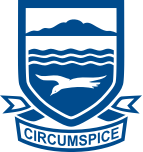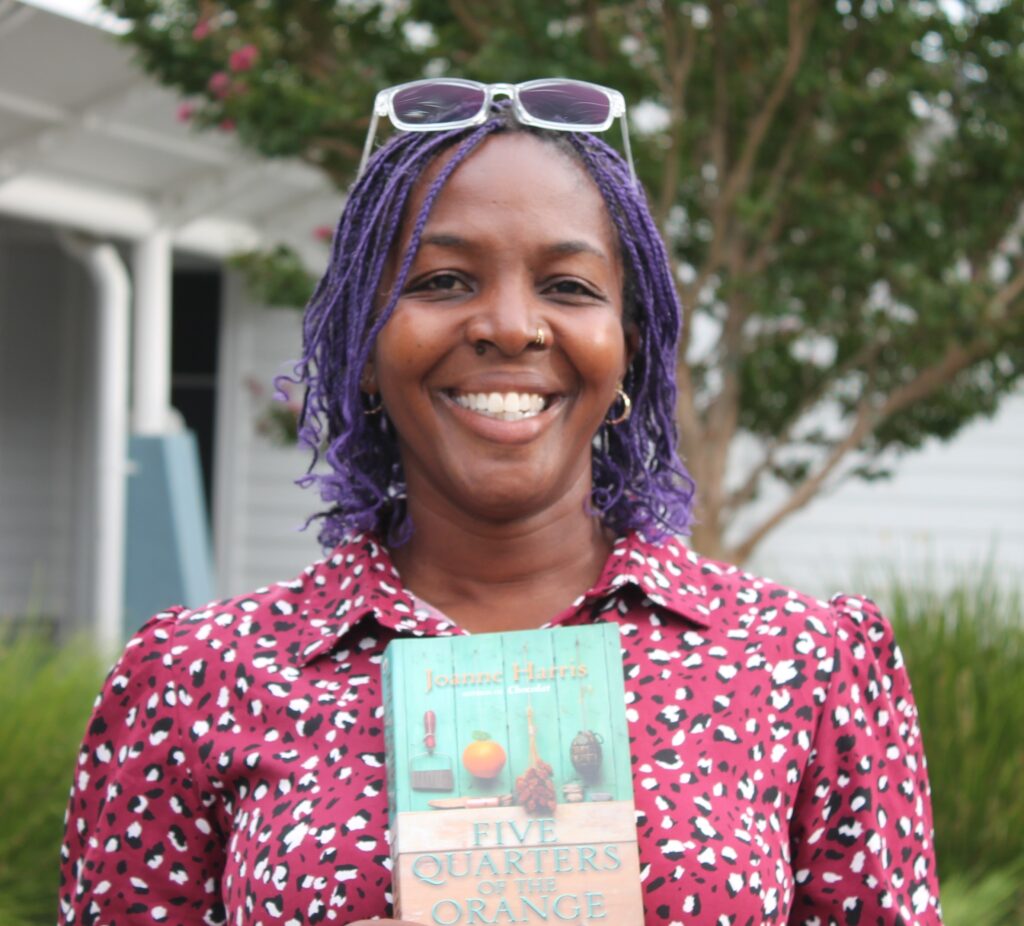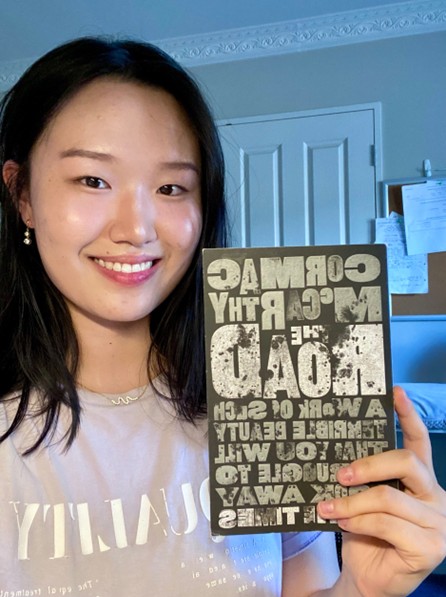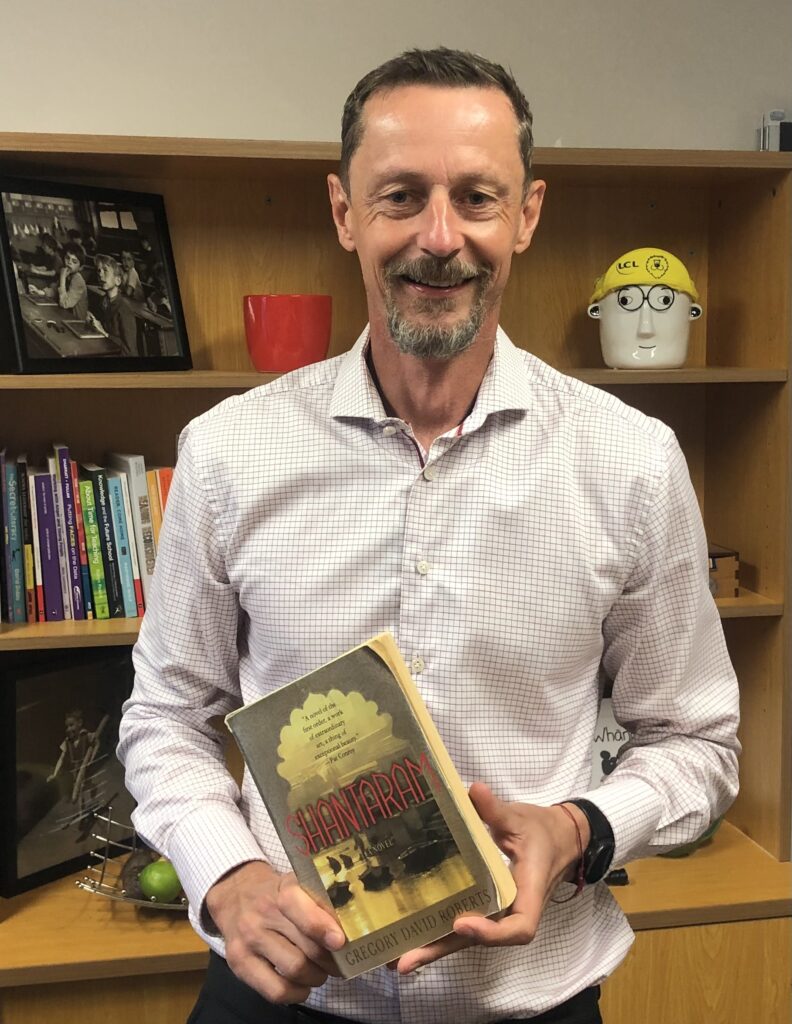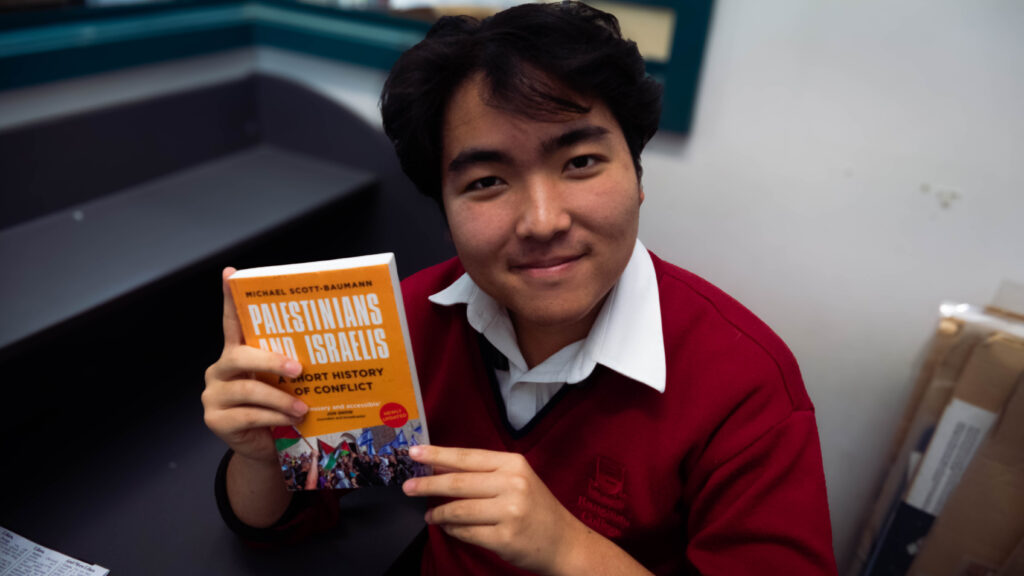Who are you?
Hi! I’m Lianne Kim, and I was a student at Rangi from 2020 to 2024. I was born and raised in NZ for my whole life – in fact, I’ve only ever been overseas to Australia and (South) Korea. My MBTI personality is INTJ (The Architect), so I’m introverted, quite independent, and I love learning about topics that intrigue me. Although I honestly loved learning about all subjects I took in general, if I had to choose, my favourite subjects during high school were economics and calculus. I won’t lie though, neither of those subjects were easy for me…
When you’re not reading, what do you love doing?
I enjoy cooking/baking (though I’m not too good at it, unfortunately). I actually had a tradition where every year after school mock exams, I would bake vanilla sugar cookies and chocolate chip cookies for my friends and teachers. After my final exams in Y13, I also picked up the guitar and self-taught myself by watching videos on YouTube.
But arguably one of my favourite things to do is quite specific. It involves driving from my house to the city at around 9pm (when it’s dark) with my parents, sitting in the back seat with the window open and listening to music. I know that sounds quite random, but you should try it – it’s quite transcendental. On that note, I love spending time with my family and parents, as me and my parents are very close.
What’s a book you remember reading/having read to you when you were little?
The first type of card I ever got in my life was a local library card under my own name. Hence, my mum actually read/showed me a new book every week when I was a child. However, one of the most memorable stories for me was The Snowman. This book actually had no words, only pictures. With this, my mum used to ask me to narrate the story, and apparently, every time I would make the storyline different.
Describe why that book is memorable to you.
I still vividly remember The Snowman to this day, as it was such a touching story about the fleeting moments of life, and as a child, the idea that snowmen could exist and be like a real person was fascinating (although the disappointing reality regarding snowmen hit me later on in life). The picture book actually also got turned into a short animation film, which I still sometimes watch to this day.
What are some books you’ve enjoyed reading here at school?
Perfume: The Story of a Murderer, by Patrick Süskind
This wasn’t a book we learnt about in class, but a story I read while I was still in high school. It is one of the most unique books I’ve read. It’s pretty hard to find a book in which the first few pages are just listing how everything in existence ‘stank’. Here’s some of the actual first few lines from the book: “The rivers stank, the marketplaces stank, the churches stank, it stank beneath the bridges and in the palaces. The peasant stank as did the priest, the apprentice as did his master’s wife, the whole of the aristocracy stank, even the king himself stank, stank like a rank lion… (this goes on for many more lines)”
The introduction definitely hooked me in (with a good laugh too), but it was the concept of the story that kept me going. It’s a story about a murderer who has a very precise sense of smell, and he becomes a perfumer, creating the most sought-after perfumes in the world from the people he murders.
What did you love about the Rangitoto College library?
I really appreciate the fact they have a diverse range of books, from manga all the way to more niche NZ books, which were especially helpful when I wanted to learn more about NZ authors, but I couldn’t find their books online.
I also love the scholarship study rooms. During my free periods in Y13, I was always there.
What’s a book that’s changed your perspective about something?
The Catcher in the Rye – J.D Salinger
No book that I have read so far captures the emotion of loneliness as well as The Catcher in the Rye. You can truly experience the loneliness of Holden to a visceral level, and that changed my perspective towards how I viewed isolation. As you read it you can feel the sense of hope slowly eroding not only within Holden, but also within yourself as the reader. It made me realise that particularly for adolescents, societal apathy is what leaves many in despair, and such indifference results in individual suffering that lies at the core of many lives going unnoticed from the public eye.
What are you currently reading?
The Road – Cormac McCarthy (I’m holding it up in the photo!)
I have already read this book before, but it’s such a great book I decided to read it again. This book definitely captures emotions of fear very accurately. The lack of punctuation, the world-building, and the constant uncertainty in a place that is long devoid of humanity, amplifies the unease experienced by the reader. Especially, during critical moments of life or death, I can say I was definitely feeling the stress alongside the characters. It’s one of my favourite books, and if you don’t mind a few sleepless nights, I recommend it.
What’s a work of literature you can recommend to others, and why?
A piece of literature that I absolutely love is actually a manga – Attack on Titan. At first, it seems quite superficial, just a typical action story of titans vs humans. But as you venture on, it becomes a story about perspective, war, and the cycle of hatred and revenge. And yes of course, if you have read it, freedom. I also noticed these themes and the storyline draw many parallels to real-life events throughout history. What I love about this story is that almost every seemingly trivial detail contributes to the plot in some way or another – it’s a brilliantly tied-together, thought provoking, emotional story.
Fun fact: During my junior years of high school, I actually begged all my friends to give it a try, and although they were hesitant at first, they all ended up loving it just as much as I did.
What’s your favourite book, and why?
This one’s a hard question, as I have a few, but I’d say The Outsiders, by S.E Hinton.
Reading The Outsiders is like stepping into a world that feels distant in terms of experiences and lifestyles, yet familiar in the emotions it captures. It’s a story about gang rivalry, in which teens who don’t have much, apart from each other, navigate society and conflicts. The characters feel like real teenagers, not simply some fictitious characters, and their stories filled with emotion and action are the kind that make you stop and think about the way people judge each other, about the things we take for granted, and about what it really means to truly “stay gold.”
Why do you think people should read?
Many books take you on a journey – you feel the emotions of the character, you laugh with them and you grieve with them. Sometimes when we really love a book, we reminisce over it, missing the characters we love, even though they are individuals that we have never met. To the millions of people around the world who read that book, whether that be in the comfort of one’s home, on the train, or alone in the middle of the night, we were all transported to that fictitious world as one, and we all went on that adventure together. There’s a real beauty in that.
Where do you seek inspiration from?
I tend to seek inspiration from people who have been in my position in the past, or are in positions that I dream to be in. I think if you have a dream, if you see someone physically in that position, it’s highly motivating because it’s living proof that it can be achieved.
Personally in high school regarding academics, since the beginning of Y13, I dreamt of getting Premier Scholar. I always looked up to every single one of the premier scholars who had achieved it before I did, and I held such a deep respect for those individuals. Their accomplishments definitely sparked a strong sense of motivation within myself, giving me the hope that someday, I would be able to achieve as much as they did.
What are some mottos you live by?
“Anything is possible, but only if you try”. My brother, Brian, first said that back in Y6, and I’ve been living by it ever since.
What advice are you grateful you’ve received?
Don’t worry too much if things don’t immediately go to plan. If you just keep your eyes on a goal, you will eventually get there.
The reasoning behind this is most understandable with a bamboo analogy. You can nurture and care for a bamboo for years, and visually see no growth or progress. However, if you keep nurturing it, one day it will suddenly grow and shoot upwards. During that time, when you didn’t see its growth, the bamboo was growing its roots and building its foundations, waiting for the right moment to rise up.
My journey throughout my life with academics has much resembled the growth of a bamboo, as for many years, I initially didn’t meet many of my goals, and as months turned into years, it often felt quite demoralising. However, as I picked up scholarships from Y12, things really took off for me from there. What I learnt from this is don’t give up, and if you grow to love the process of learning, or anything you choose to pursue, you will be rewarded in the end.
What are some of your hopes and dreams for the future?
I want to be someone that is always driven by a strong sense of purpose, no matter what I end up doing. Regardless of what I pursue, I hope that I will end up loving it, because so far in my journey through high school, my love for learning is what kept me pushing through moments of adversity during those years of my life. I hope that the same level of passion will guide me through the challenges that my life holds ahead for me.
What do you like to do in your spare time?
I have indulged in true crime, mystery cases, and tragic survival stories ever since I was about 13. I think this began with learning about true crime via the Infographics Show on YouTube. However, as I got older, I liked to watch more documentary-style videos, and go through the official case reports online. From controversial convictions, serial murderers, caving incidences to unexplained disappearances – I’m interested in them all. I am drawn in by the “what if” factor – how could things have gone differently if something didn’t happen? For cases that have no conclusive answer, I often find myself pondering what I think actually happened. The fact that for some of these cases, we may never find out the true story is chilling. One of my favourite cases is of Duncan MacPherson (check it out if you’re into crime cases).
I also like to research into history – I have spent a lot of time investing myself into learning about the Annexation of Korea, The Holocaust, colonisation, and other heavy atrocities humans have inflicted on another, which never fails to appall me towards how barbaric some people can be to others. In my opinion, learning about history is one of the most important things – we cannot simply forget the mistakes and actions of the past, otherwise we risk repetition.

